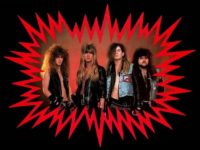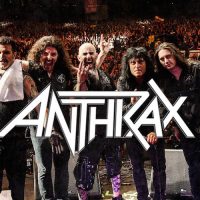I’m not normally the kind to get overly emotional about a celebrity’s death, even one whose work has touched me in some way. I may think “that’s a shame,” or take a few minutes to revisit a favorite piece of their work, but I’ve never been one to mourn someone that I didn’t know personally.
Perhaps the first time that it happened was 10 years ago. I had logged on to my computer to check e-mail that morning, the day after my birthday, and I saw Pantera guitarist “Dimebag” Darrell Abbot’s face on the main news page. “What’s Dime doing on this page?” I asked my wife sitting across the room. The next words to come out of my mouth, after I clicked on the story, were “Oh, shit. He’s dead.”
At the time it happened, I had been through a few recent losses of people close to me, and I was scheduled to go to the hospital that afternoon to visit a family member who was not doing well. I wasn’t in the best frame of mind. Then there was the absolute craziness of what had happened. A gunman opening fire on the stage at a concert. It was something that I don’t think anyone had really considered happening before that night. At least, I hadn’t.
It all combined to hit me like a ton of bricks, and I think, for the first time, I really, truly mourned someone that I hadn’t known.
Of course, I did know him in a way, like millions of others did. I never had the chance to interview Dimebag Darrell, but I did have the pleasure of seeing him live with Pantera, both near the beginning of their rise to fame and in the final days of the band.
The first time was shortly after the release of their major-label debut, Cowboys from Hell, at a place called the Million Dollar Sandpiper in Shreveport, La. It was part live music venue, part strip club, and I can’t imagine a better venue to see an easy-going, party-hard sort of guy like Dime, who was still known as “Diamond” Darrell at the time. I came into the show not knowing a whole lot about Pantera, and I left it as an evangelist for the band, telling all my friends they had to check these guys out. I was able to catch the band once more in Biloxi, Miss., on their final tour for 2000’s Reinventing the Steel. By that point, the cracks between the members were already turning into fissures, but you couldn’t tell it from the raging performance they turned in that night.
I had a few other opportunities to see the band live that I missed, and I regret them today. One, in particular, when they were the opening act for Black Sabbath during their first reunion with Ozzy. It always seemed to me there would be other chances. Even after Pantera broke up, you knew, eventually, they’d be back together. That is, until Dec. 8, 2004.
Though most of us didn’t know him personally, if you were a Pantera fan, you certainly felt like you did. There really wasn’t a rock star persona with Dimebag Darrell. He was what he was, a sort of crazy, fun-loving guy, who seemed to be at ease with anyone. He got on well with commercial rockers like Nickelback, who most metal guys would have avoided like the plague. He could even befriend an ornery cuss like outlaw country artist David Allan Coe, who he recorded the redneck rock album Rebel Meets Rebel with. He seemed to be a lover of music who didn’t draw the silly lines that so many other metal acts and fans do. Even before his death, you wouldn’t have found many people who didn’t like him.
He’s been memorialized in song by a number of artists, some good, some not so good. Nickelback’s “Side of a Bullet” raged against his killer and featured one of Dime’s unreleased solos. Thrashers Machine Head’s “Aesthetics of Hate” was inspired by a scathing and, in my opinion, disgusting article that appeared in a conservative Christian publication after Dime’s death. In the alt-country world, Cross-Canadian Ragweed remembered him, along with other artists, in the wistful “Dimebag.” Though written shortly before his death, Black Label Society’s “In This River” has become sort of the mourning song for the guitarist. And Pantera singer Phil Anselmo addressed his feelings in the Down song “Mourn,” though that gets into another conversation that really isn’t appropriate for this piece.
Then, of course, there was the music. Dimebag Darrell’s techniques weren’t, perhaps, revolutionary. They’d been developed and mastered by tons of players before him. But the way that he mixed them was truly masterful. He drew influences from all over the rock world. Always first on Dime’s list was Ace Frehley, who he loved so much that he had a signed tattoo of the Kiss axe slinger. Like many other guitarists of his generation, he also drew great inspiration from Eddie Van Halen and Ozzy guitarist Randy Rhoads. Fellow Texans Billy Gibbons of ZZ Top and Ty Tabor of King’s X also left their mark on his style. In the space of just a few years, Dime used all of these to go from an imitator to an innovator.
Pantera’s beginnings were in the pop/hair metal scene of the 1980s with those infamous first four records that no one in the band seems to want to acknowledge now, even though a couple of them — particularly Power Metal, which saw the introduction of Anselmo — were pretty good. Though many accuse Pantera of changing their style for their 1990 major label debut Cowboys from Hell, the truth is, if you listen to those first four records, the band got progressively a little heavier on each one, particularly on Power Metal. Yes, Cowboys from Hell was a far different beast from the first record, Metal Magic, but not as drastically removed from Power Metal.
But what a beast Cowboys from Hell was. To this day, that first riff of “Cowboys from Hell” cannot come on the stereo without me cranking it up to window-rattling volume levels. It’s one of those riffs, and songs, that never gets old for me. It thrashes with an intensity rarely matched by masters of the game like Metallica, yet through it all, Dime’s playing never loses its Texas roots. You can hear them clearly in the bluesy bends of his leads, and it was a theme that ran through a record that was largely high speed thrash.
Their second Atlantic record, Vulgar Display of Power, often cited by fans as a favorite, saw Dimebag Darrell and his bandmates beginning to come into their own. They introduced some elements of hardcore and more of a grooving feel without sacrificing any of the heaviness that marked Cowboys from Hell.
A third release, Far Beyond Driven, then stunned many by debuting atop the Billboard charts. Though it was their most commercially successful album, it’s also a personal favorite of mine. I think it captures the true essence of the band. The groove is there, but there’s this underlying gnarly heaviness just lurking beneath the surface, waiting for its chance to rip your throat out. It also features my favorite Pantera tune, “Becoming.” The pounding and shrieking main riff of the song is one of my favorite riffs ever, by Dime or anyone.
Pantera could bang with the best of them, throwing out undeniable grooves like “I’m Broken” or “Regular People (Conceit),” and they could bash your brains in with raging walls of barely-restrained chaotic noise like “Primal Concrete Sledge” or “Use My Third Arm.” But Dimebag Darrell was also capable of very soulful passages, too. Check out the emotional “Floods” from the band’s fourth album The Great Southern Trendkill. Though I wasn’t sold on that record at its release, the song has become a favorite over the years and, I think, one of Dime’s finest moments.
To this day, I still have trouble classifying Pantera. Most people have come to call them groove metal, and largely give them credit for creating the subgenre, but they were more than that. They were thrash, they were noise metal at times, and though the surviving members may not want to admit it, they were hair metal once. But they were also Southern rock and blues rock — never overtly, mind you — but it was always lurking there around the edges, primarily in Dime’s playing.
When recently re-cataloging my music collection after a computer crash, I struggled trying to fit the band into some niche, and I think I finally hit upon the only possible solution. In my spreadsheet, and in reality, Pantera is simply metal. No other descriptor needed.
Pantera may well have been the last iconic metal band. The way that Black Sabbath ruled the first wave of metal in the 1970s and Metallica reigned in the 1980s, Pantera held sway in the 1990s. No band has really risen to take that crown of THE metal band since. Maybe no one’s come along who can. Their music is sorely missed and, a decade after his death, the metal world could certainly use hearing Dimebag Darrell’s trademark Dean ML just one more time.
- How Black Sabbath’s Self-Titled Debut Invented a New Genre of Music - February 5, 2025
- Alestorm, Ratt, Zeal & Ardor + Others: Fred Phillips’ Best of 2024 Metal and Hard Rock Songs - January 26, 2025
- Cody Jinks, Blackberry Smoke + Others: Fred Phillips’ Best of 2024 Country and Southern Rock - January 20, 2025



